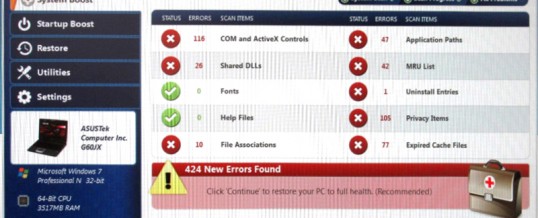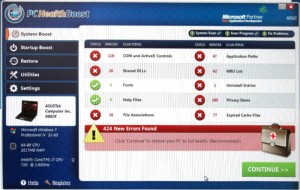
 You are on your computer and get a pop-up telling you that your computer is horribly infected, and that you need to buy this special malware remover to fix your computer. During the installation process you are told to call an 800 number to complete registration and activation. $300 later, you have allowed the bad guys to install remote access software and God only knows what else on your computer.
You are on your computer and get a pop-up telling you that your computer is horribly infected, and that you need to buy this special malware remover to fix your computer. During the installation process you are told to call an 800 number to complete registration and activation. $300 later, you have allowed the bad guys to install remote access software and God only knows what else on your computer.
Or out of the blue you get a phone call from someone identifying themselves as a Microsoft employee or Microsoft partner, and they tell you that they have noticed unusual traffic from your computer indicating a malware inflection. They show you a bunch of “errors” in Windows Event Viewer. $300 later, you have allowed the bad guys to install remote access software and God only knows what else on your computer.
Sometimes they even sell “support plans” giving you an years worth of remote support services, but they call back over and over reporting problems that don’t really exist, but somehow require even more money to fix.
If you have been victimized by these charlatans posing as employees of “Microsoft,” “Windows,” or “your Internet service provider” then you are probably delighted to see the the Federal Trade Commission has been after the US-based support companies engaging in this deceptive practice. From the FTC web site:
The FTC sued several of these phony tech support companies – New York-based Pairsys, Florida-based Inbound Call Experts (ICE) and Florida-based Vast Tech Support – for misrepresenting that they found security or performance issues on consumers’ computers. At the FTC’s request, three federal judges halted these alleged scams pending trial.
Now if there was something to be done with the plethora of fake support companies that are based in India, the Philippines, and other off-shore havens beyond the reach of US law enforcement.
I have personally worked with many people who have been targeted by this scam. It appears that these operations target seniors primarily, because they are easily confused by technology, and tend to be more trusting. Remember, if you get one of these calls, they are always a scam, so just HANG UP!
For more information:
ShareDEC




About the Author:
I am a cybersecurity and IT instructor, cybersecurity analyst, pen-tester, trainer, and speaker. I am an owner of the WyzCo Group Inc. In addition to consulting on security products and services, I also conduct security audits, compliance audits, vulnerability assessments and penetration tests. I also teach Cybersecurity Awareness Training classes. I work as an information technology and cybersecurity instructor for several training and certification organizations. I have worked in corporate, military, government, and workforce development training environments I am a frequent speaker at professional conferences such as the Minnesota Bloggers Conference, Secure360 Security Conference in 2016, 2017, 2018, 2019, the (ISC)2 World Congress 2016, and the ISSA International Conference 2017, and many local community organizations, including Chambers of Commerce, SCORE, and several school districts. I have been blogging on cybersecurity since 2006 at http://wyzguyscybersecurity.com